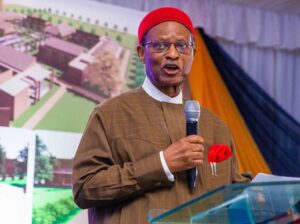The Imperative of Restructuring: A Call for True Federalism in Nigeria
Nigeria, a nation of immense diversity and potential, stands at a critical juncture. Its current centralized structure, inherited from military rule, has become a source of increasing strain, hindering development and threatening the very fabric of its unity. Prominent voices, including elder statesman and former Commonwealth Secretary General, Chief Emeka Anyaoku, are raising urgent calls for a return to true federalism, warning that the country risks disintegration if it continues along its present path. Anyaoku, drawing on Nigeria’s own history and the experiences of other multi-ethnic states, argues that a new constitution reflecting the country’s pluralistic nature is essential for its survival. He points to the first six years of independence, when Nigeria operated under a genuine federal constitution, as a period of greater peace and faster development, citing the autonomy enjoyed by the then four regions over their development, social services, and internal security. This autonomy, he contends, fostered a sense of ownership and responsibility that is absent under the current unitary system.
The central argument for restructuring revolves around the devolution of power. Proponents of true federalism believe that concentrating power at the center has created a bloated and inefficient bureaucracy, unresponsive to the needs of diverse communities. They argue that a decentralized system, where states have greater control over their resources and governance, will unleash the potential of each region, stimulate healthy competition, and promote more equitable development. This devolution of power, it is believed, will also bring governance closer to the people, enhancing accountability and responsiveness. The current system, they contend, fosters a sense of alienation and marginalization, contributing to the rise of ethnic and regional tensions.
The call for restructuring is not merely about administrative efficiency; it addresses fundamental questions of identity and belonging. Nigeria’s diverse ethnic and religious groups, each with its own distinct history and culture, have long struggled to find a common ground within the existing centralized framework. Anyaoku and others argue that true federalism, by recognizing and accommodating these differences, can forge a stronger sense of national unity. It offers a framework for managing diversity, allowing each region to express its unique identity while remaining part of a larger national whole. This, they believe, is the key to unlocking Nigeria’s vast potential and ensuring its long-term stability.
The urgency of this call for restructuring is underscored by the growing insecurity and instability plaguing the nation. The centralized security apparatus has proven ineffective in addressing the complex challenges posed by terrorism, banditry, and other forms of violence. Proponents of restructuring argue that a more decentralized security architecture, including the creation of state police forces, is essential for effectively combating these threats. State police, they argue, would be more familiar with the local terrain, culture, and dynamics, enabling them to respond more effectively to security challenges. This, coupled with community-based policing initiatives, would enhance security at the grassroots level and build trust between law enforcement and local communities.
Beyond security, restructuring is also seen as crucial for addressing other critical challenges facing Nigeria, including education and economic development. A decentralized education system, proponents argue, would allow each region to tailor its curriculum to meet the specific needs of its population, promoting relevant skills development and fostering innovation. Similarly, greater control over resources would enable states to pursue economic development strategies aligned with their comparative advantages, leading to more balanced and sustainable growth. The current system, they contend, stifles creativity and innovation, hindering the development of human capital and economic diversification.
The call for true federalism in Nigeria is not merely a technical or administrative issue; it is a fundamental question of national identity, unity, and purpose. It represents a yearning for a system of governance that reflects the country’s diverse reality, empowers its people, and unleashes its vast potential. The ongoing debate about restructuring is a testament to the enduring spirit of Nigerian democracy and the unwavering commitment of its people to building a more just, equitable, and prosperous nation. The challenge now is to translate this national conversation into concrete action, forging a new constitutional framework that will safeguard Nigeria’s future and ensure its place among the leading nations of the world.














